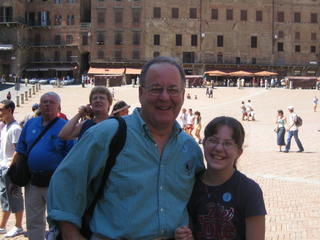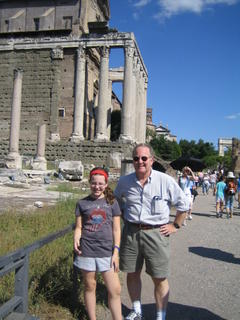


Pictured here, MMC and daughter at the Roman Forum (and Siena), August, 2005. 2500 years of history, layer upon layer, in the footsteps of the Emperors, the foundations, both literally and figuratively, of Western civilization, and all I can think about while here is, 'My god, its, 95 degrees and what I wouldn't give for a cool Lime Squishy and a dunk in a pool.' Of course, there was no pool available. OK, so creature-comfort comes before my appreciation of high culture and the history of Wesern Civ . I'm spoiled. I've become a member of the air conditioned class. (Thanks Sandra for the Class designation)
For all those awaiting more philosphical insight: Here is what I am thinking today: Why have human civilizations throughout history so much depended upon barbarism, terror, and violence, to sustain themselves? Take, for example the Roman gladiatorial system and the theme of brutal circuses and free bread. It wasn't just that the participants must have been brutalized, but the whole of Roman society must have internalized a kind of normalized violence and cruelty. Oh Oh! (Sound Familiar?) Fast forward 2000 years: Q: What's changed in contemporary, advanced industrial societies? How much have we progressed? A: Air conditioning.
Today, in our contemporary culture, we have plenty of spectator viloence, although much formerly overt public violence has been hidden from view and is perpetrated far from our eyes (e.g Iraq and Afganistan, Darfour, etc.). At home, sadistic cuelty now takes the place of gladiatorial mahem in the cultural arena; to wit "reality" TV shows (which are, of course aything BUT, real) and the fine achievments on offer, from FOX, like "the Apprentice."
In any case, we saw Rome, Venice, Siena, Pisa, and Florence. Took in all the sites--including the Doge's palace in Venice. Lots of old buildings and old culture. And old illustratrions of the connections between culture, politics, economics and power. I really liked the Doge's palace, in Venice, because among other things, it illustrated perfectly, the early inseparability of church, the organized military violence of the state, and (Catholic) ideology. (The ideology was of course, more beautifully portrayed by impressive painters, than today's global Coke and Rebok ads). The 'Bridge of Sighs' runs directly from the Doge's palace (the seat of political and merchant economic power) to the prison and torture rooms. So it must have been pretty clear to 17th c Venetians who held the power and to what use such power was directed. Church, state,
military----all within a few hundred yards of one another. All wrapped up in one palace-sized complex of state power. As I mentioned to H, it would be likehaving the Capitol building in Washington DC, the federal prisons, and the U.S. Army all connected by a convenient catwalk.
Ummmm, maybe things haven't changed that much, after all?? Except for, of course, the air conditioning.


1 comment:
Let's unpack the ideological construct, "air conditioning." Some (Moo Moo Camus, for instance) believe that history has progressed from barbarism, primitive communalism, feudalism, capitalism, state capitalism/bureaucratic collectivism/"Communism", and back again to capitalism only to arrive at a new definition of the highest stage of capitalism. Lenin called it "imperialism." MMC and co. consider "the air conditioned state" as the apogee of human development. We disagree ("we" being myself and my dog, Jake).
Here's why. The air conditioned state relies heavily on cold air. For a time this worked out, but only because in the past, during the postwar "Boom" heard following Hiroshima, countervailing forces in the form of "hot air" remained subordinate to cold air. Since the governmental coup in 2000 in the United States, the air conditioned state has come under direct siege by the forces of hot air. Nowhere is this more apparent than in Iraq, where despite some of the world's largest reserves of oil, which used to be directed towards support of the air conditioned state, such a state is now barely in evidence for a few hours a day, in a few highly fortified locations. In most of Iraq, the air conditioned state is nowhere to be seen. Some speculate that its remains might be buried in a bunker alongside WMD.
Meanwhile, in the US, a shrinking portion of the populace is favored by the air conditioned state. Although McLuhan termed television a "cool" medium, its original status has been undermined by its commercial evolution. Previously many workers were able to function in their daily lives (work, reproduce themselves, reproduce the system, and go to amusement parks) even during summer because their TVs functioned much as an air conditioner might, chilling their homes with an ideological coolant, and putting revolutionary potential into a deep freeze. This represented a stalemate in the global struggle between hot air and the air conditioned state.
Since the unfortunate advent of cable television, direct satellite TV, and globalization allowing for the control of programming by a half dozen right wing corporations, the cooling process has been subverted. Now so much hot air emanates from the box, reheated as it is recycled from the most reactionary sectors of the ruling class, that the future of the air conditioned state has been thrown into question. The working class home—locus of the American Dream—is heating up. Already in the 21st century its temperature has risen more than in the entire previous century.
When I asked my golden retriever colleague Jake what part of the working class home needs to be removed in order to address the future of the air conditioned state, and to let in a breath of fresh air as relief from the hot air, he responded with a single insight: "Roof! Roof!" he said.
I would agree. Eliminating the roof would provide workers an alternative to television as a way of seeing the world. Without roofs air conditioning cannot function, but neither can hot air. We suggest that this represents the only viable avenue out of the historical cul de sac in which we find ourselves.
Post a Comment